Student Union
Trump Administration Backs Asian-Americans in Harvard Case
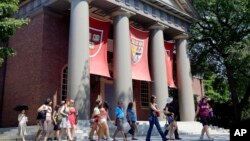
The Justice Department on Thursday sided with Asian-American students suing Harvard University over the Ivy League school’s consideration of race in its admissions policy, the latest step in the Trump administration’s effort to encourage race-neutral admissions practices.
The Justice Department said in a court filing Thursday that the school has failed to demonstrate that it does not discriminate on the basis of race and cited what it described as “substantial evidence that Harvard is engaging in outright racial balancing.”
The department’s “statement of interest” was in a case filed in 2014 by Students For Fair Admission, which argues that one of the world’s most prestigious universities discriminates against academically strong Asian-American applicants. Harvard fired back, saying that it does not discriminate and will fight to defend its right to use race as a factor in admissions.
The Supreme Court permits colleges and universities to consider race in admissions decisions, but says it must be done in a narrowly tailored way to promote diversity and should be limited in time. Universities also bear the burden of showing why their consideration of race is appropriate.
But in Harvard’s case, Justice Department officials said, the university hasn’t explained how it uses race in admissions and has not adopted meaningful criteria to limit the use of race.
Attorney General Jeff Sessions said, “No American should be denied admission to school because of their race.”
Harvard said it was disappointed by the Justice Department’s “recycling the same misleading and hollow arguments that prove nothing more than the emptiness of the case against Harvard.”
“Harvard does not discriminate against applicants from any group, and will continue to vigorously defend the legal right of every college and university to consider race as one factor among many in college admissions, which the Supreme Court has consistently upheld for more than 40 years,” the university said in a statement. “Colleges and universities must have the freedom and flexibility to create the diverse communities that are vital to the learning experience of every student.”
Sessions argued the school’s use of a “personal rating,” which includes highly subjective factors such as being a “good person” or “likeability,” may be biased against Asian-Americans. Sessions said the school admits that it scores Asian-American applicants lower on personal rating than other students. Sessions also argued that Harvard admissions officers monitor and manipulate the racial makeup of incoming classes.
Edward Blum, president of SFFA, hailed the administration’s action. “We look forward to having the gravely troubling evidence that Harvard continues to keep redacted disclosed to the American public in the near future,” he said.
The Justice Department’s court filing opposes Harvard’s request to dismiss the lawsuit before trial.
“Harvard’s failure to provide meaningful criteria to cabin its voluntary use of race, its use of a personal rating that significantly harms Asian-American applicants’ chances of admission and may be infected with racial bias, and the substantial evidence that Harvard is engaging in outright racial balancing each warrant denial of Harvard’s Motion for Summary Judgment,” the department said in the filing.
The department is separately investigating Harvard’s admissions policies, a probe that could also result in a lawsuit.
The filing follows a July decision by the Justice and Education departments to abandon Obama-era guidelines that instructed universities to consider race in their admissions process to make the student body more diverse. Democrats criticized the decision, saying that the Trump administration was taking away protections for minorities.
Civil rights advocates blasted the administration’s filing.
“The Trump administration again put itself on the wrong side of history ... contrasting its positions with more than four decades of clear and consistent Supreme Court precedent,” said Catherine Lhamon, the top civil rights official at the Education Department under the Obama administration.
See all News Updates of the Day
- By VOA News
Michigan State international students get their own space
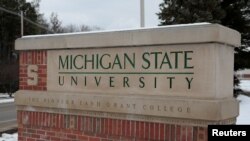
Michigan State University in East Lansing, Michigan, is setting aside a space in the International Center for international students.
Nidal Dajani, vice president of the school's International Student Association, said that the club plans to use the space to host events and hopes to collaborate with other student groups.
- By Dylan Ebs
International students find community during Pride Month
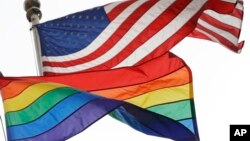
For LGBTQ+ international students, Pride Month, observed in June, is a unique time to reflect.
They hold on to multiple identities — both their LGBTQ+ identity and their cultural background — but coming to terms with them is not always easy.
For graduate student David Zhou, these identities can feel conflicting as transgender rights in China remain a controversial issue and spaces for LGBTQ people close. Zhou, 25, is transgender and pursuing an education in the STEM field at an urban university in the Midwestern United States.
VOA is using a pseudonym for Zhou’s first name and is not naming his university to protect his identity due to safety concerns back home in China. Zhou is not open about his transgender identity to his family.
During Pride Month, Zhou said he attended multiple LGBTQ+ events in his community and is surrounded by a supportive group of LGBTQ+ students who can relate to his experiences. But he’s not open about his identity to everyone on campus and said he doesn’t disclose his preferred pronouns to everyone to avoid transphobic comments.
“I feel like I have to make some judgments of the character of that person to see if they’re a good person to disclose [my identity] to,” Zhou said.
Zhou’s Pride Month celebrations included attending local markets with LGBTQ+ vendors and hanging out with his LGBTQ+ friends.
“They normalized being trans and for a long time I feel like trans identity is, should I say a vulnerability, brings me fear and worrying about discrimination, but having those events are helpful because it allowed me to see that queer people could just [live] openly,” he said.
At social events where few international students are present, Zhou said it can be tough to fit in.
“There's a lot of times like when they were talking about things I kind of, don't really understand, mostly because I kind of lack some background experience or knowledge,” he said.
Zhou said he is not aware of specific groups for LGBTQ+ international students at his university, but said international students are more prevalent in graduate programs and therefore find representation in organizations for LGBTQ+ graduate students.
In China, transgender individuals must obtain consent from an “immediate family member,” even for adults hoping to transition, which critics say limits the autonomy of transgender individuals while supporters say the policy protects doctors from violence by upset parents.
Struby Struble, a former coordinator of the University of Missouri LGBTQ+ Resource Center, told NAFSA: Association of International Educators in 2015 that LGBTQ+ international students face a “double barrier” on campus.
“With their international student friends, they feel isolated because they’re the LGBT one,” she said. “But then among the LGBT students on campus, they feel isolated because they’re the international one.”
Nick Martin, associate director of the Q Center, Binghamton University’s LGBTQ+ student support office, said when international students tour the center, there’s often a sense of hesitation as they enter a type of space that may not be present in their home country.
“I compare that to a year in after they've come into the space, they've again, maybe come to some of our events, they've got more connected,” he said.
Martin said graduate students have a unique interest in the Q Center as they may use the office for research and advocacy purposes that align with their studies.
“For older students, there may be hesitancy in a different way, but I think it's more in the vein of they want to do some of the advocacy work,” he said.
Martin said he thinks about how both his office and BU’s international student office can support students who come from countries with few — if any — protections for LGBTQ+ individuals.
“It's been a learning process of what those students really need, but I think I've kind of learned that a lot of students are just looking for the safe space that we offer,” Martin said.
- By VOA News
International students discuss US campus culture shock

International students at De Anza College in Cupertino, California, talked about culture shock in an article in La Voz News, the student newspaper.
"It felt like a major culture shock. Everything was so different, from academics to mannerism," said a student from Mexico.
Read the full story here.
These are the most expensive schools in the US
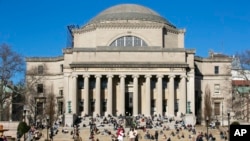
High tuition costs along with housing and food expenses can add up for students at U.S. colleges and universities.
MSNBC looked at the most expensive schools in the country, with one costing more than $500,000 for a bachelor’s degree. (June 2024)
Uzbekistan students admitted into top US universities
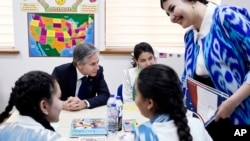
Students from Uzbekistan are among the international students admitted to top colleges and universities in recent years.
Gazata.uz profiled some of the Uzbekistan students attending Harvard, Brown, Princeton and other U.S. universities. (June 2024)






